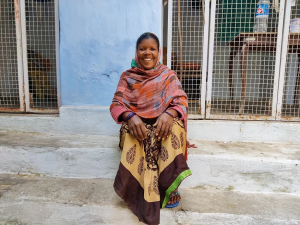People of Bharat: Imli, Ambikapur

I meet Imli in the backyard of the house where she lives alone — in a one-room kutcha house in Ambikapur, a small town in Chhattisgarh. We sit on the stairs in the courtyard to talk. Imli is short and dark; her round face is braced with a smile when she tells me that Imli is not her real name! I am shocked as I have known her since a long time. I have also seen the name ‘Imli Singh’ in her bank passbook while helping her fill a cash deposit slip. ‘Mei khud hi nai janat rahein’ (I myself didn’t know my name) she says — not until she applied for an Aadhaar card. In Imli’s tribal village, people do not call a person by their real name as it is deemed inauspicious. Usually, people pick the names of fruits and vegetables as nicknames. Imli means tamarind (a sour fruit) in Hindi. Imli sought assistance of her landlord to open a bank account and as he didn’t know her real name, he opened the account with her first name and his last name. That is how Phoolkumari Nageshiya became ‘Imli Singh’ on paper.
Imli’s guess is she is about 40–45 years old. She tells me she was born and raised in Gujarwar; a tribal village 50 kilometers from Ambikapur. She has never been to school and currently works as a Reja — a term used for unskilled women laborers. Her parents worked as farm laborers as their own land was too small to grow anything and owned two bullocks. Imli was the eldest of five siblings, she has two brothers and two sisters.
I ask her about her childhood. ‘I had a very difficult one. If money had not been scarce, I would have never landed up here in Ambikapur’ she says.When Imli was ten years old, she was married off to a young man in the village. Four months later, he ran away with another woman. Imli was sent to live with her aunt who worked as a construction worker in Ambikapur. Every day, Imli and her aunt would walk to the labor naka — an intersection of main roads called Thana Chowk in Ambikapur. Once there, they waited to be picked up as laborers on construction projects. ‘My aunt taught me the ropes of construction work’ she says.
Imli earns INR 300–350 per day. She tells me she does the work of a Mistry — male construction worker but does not get equal pay. As a Reja her employers assume she has no skills and only loads and unloads construction material. She tells me the application of cement and arrangement of bricks requires a skill that is generally common among men. Despite doing the work of men she is not paid INR 500–550 which is the designated pay for a Mistry.
During the lockdown, Imli’s landlord, community members and others donated groceries for her survival. She still has some of those and speaks gratefully of ‘helpful people’ around her. When travel restrictions were relaxed, her brother came by tractor and took her back to the village for a few days. Post the COVID-19 lockdown, Imli has faced difficulty in landing regular work. She works only two-three times a week as compared to every day before the lockdown. Less work means less income for Imli; still she manages to send INR 1000 to her parents each month with her sister who comes to visit. Her brothers have separated from her parents and do not contribute to their household expenses. With some pride she says ‘more dai dau la mei paalat hoon” (I take care of my parents). Imli spends on groceries — grains, vegetables, oil and soap. She is exempted from paying rent as she works as a house help at her landlord’s place. Before the lockdown, Imli managed to earn INR 8–10,000 a month and even saved a little. Presently, she has INR 2500 in her bank account. Last year, Imli’s father was treated with a skin condition at a government hospital. Imli spent INR 6000 for his medicines.
Imli’s wish is to get her younger sister married but the wedding is being stalled because of financial strain. Imli shows me the wedding dress she has bought for her sister, she keeps it locked safely in a wooden cupboard. The wedding trousseau and accessories cost her INR 8–10,000. ‘I have no money to buy her jewelry’ she says, tears welling up in her eyes.
Imli faces a lot of problems due to improper documentation. She has two bank accounts in different names. She is unable to get a Ration Card issued and therefore unable to secure grains at fair price rates. A few years ago her father received an amount from a government housing scheme to build a house. Thanks to that, Imli’s parents own a two-room house in the village. They have an electricity connection but it hardly works. They also have a gas stove but her parents do not know how to use it. Imli cooks on the stove when she visits them. Her parents have a ration card and use it to buy grains at subsidised prices. I ask Imli if she has ever considered getting married again. ‘Why would I? All (men) are drunkards!’ she exaggerates.
For the future, Imli wants to start her own shop selling groceries or snacks, if she can manage to save the capital required for it. ‘I would be able to sit at home and work’ she says. For someone who is out working, exposed to the elements, this would be a life of luxury. But she knows this goal is difficult to achieve. Imli has never taken any loan but is now considering borrowing from her landlord for her sister’s wedding. Imli worries about her sister’s wedding and her aging parents. ‘Moke kaam chahi bas, moke aage badhna hai bas’ (All I want is regular work. I want to grow) she adds.
